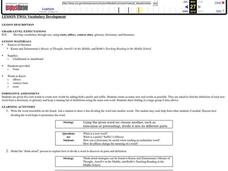Curated OER
Come Fly with Me . . . Open a Book: Travels through Literature
This detailed overview of a curriculum unit suggests using travel literature to engage and stimulate your third graders’ interest in reading. The suggested reading list includes fiction and non-fiction materials and offers urban children...
Open Oregon Education
The Word on College Reading and Writing
Many people struggle putting their words into writing. However, writing does not have to be difficult. The Word on College Reading and Writing offers all areas of support for writers and readers. The text takes literature lovers all the...
Ohio Department of Education
Word Origins
Understanding a word's etymology can really help with decoding and building vocabulary skills. Readers compare and contrast words of similar origins but with different difficulty levels. They focus on prefixes, suffixes, and affixes....
Curated OER
Guide Word Sentences
Learners write sentences using dictionary guide words, putting two guide words from the same page in the same sentence. They demonstrate creative-writing and vocabulary skills to write sentences using dictionary guide words.
Novelinks
The Winter’s Tale: Shakespeare’s Words
Varier wag? I'fecks? Posterns? As part of their vocabulary study, readers of The Winter's Tale try their hand at crafting Shakespearian-style sentences using words drawn from the play.
EngageNY
Mid-Unit Assessment: Close Reading of Bullfrog at Magnolia Circle: Bullfrog Life Cycle
The sixth lesson plan in this Bullfrog at Magnolia Circle unit assesses your third graders' ability to read and understand informational text. The included assessment asks learners to take notes about the main idea and supporting...
Curated OER
Using Word Referents
Students edit an existing piece of writing focusing of improving word choice. They create lists of words that can be used in place of the main topic and rewrite the piece using the new vocabulary.
Curated OER
Dolch Sight Word Booklet
First and second graders expand their vocabulary by reading a word recognition booklet. In this English vocabulary instructional activity, learners utilize a booklet of 220 basic sight words which they read over everyday and are...
EngageNY
Resource Materials and Gathering Information: Reading Another “Choice” Text from the Research Folder
Look it up. Scholars use a dictionary and thesaurus to verify the meaning of the research vocabulary words they defined in the previous activity. They then use sticky notes to write a synonym for each word. Finally, individuals choose a...
Curated OER
Vocabulary Development
What is a root word? What is a prefix? Suffix? Use these questions to spark a discussion amongst your language art learners. Then, start by writing the word irresistible on the board and have teams of learners attempt to create new words...
Curated OER
If a Runner Runs, Does a Sweater Sweat?
Play with words and word meanings involving the suffix -er. After reading a sample list of words, young readers look up each one in the dictionary to decide which words refer to people, animals, or objects, or have three or more...
Curated OER
Let's Get it Together! Reading to Learn
Let’s learn about frogs! Young readers are led through “Freaky Frogs,” a non-fiction article. Teach learners how to edit an article so there are fewer details to sift through. After talking through the article, they learn the six steps...
Curated OER
It's Opposite Day
Celebrate Opposite Day by using a Visual Thesaurus to match words to their antonyms. They match a list of vocabulary words to their antonym counterparts using the Visual Thesaurus, and then they play Antonym Bingo with the words from...
Curated OER
The War of the Words
“Who’s This Guy Dylan Who’s Borrowing Lines From Henry Timrod?” The basic question in this lesson from the New York Time’s Learning Network is whether artists and authors who use the words of others are stealing from that artist or...
Curated OER
When Is a Noun a Verb? Examining Double Duty Words
The New York Times' Learning Network provides great lessons! This one uses articles from the paper to help readers understand homonyms like mail (verb and noun). It also includes an exercise in reading informational text. Links to the...
Curated OER
Go for the Gold!
The options are vast with this Ancient Greece and Olympics research project! Using Scholastic online resources, historians have interactive and educational supports to guide them through researching and writing about the 2004 Olympics in...
Curated OER
Making More Words With "at"
Students explore phonetics by identifying words with one specific sound. In this rhyming words lesson, students discuss the sound "at" and the many words that contain the same sound. Students utilize index cards to participate in a word...
Curated OER
Pendemonium: The Italian Job
Discover how to use prefixes and suffixes to determine the meaning of unfamiliar words. The group views a jovial video on the topic, and then they create a chart of prefix and suffix meanings to identify the meanings of words in a social...
Curated OER
Clicking Your Way to Poetry: Composing Word Association Poems with the Visual Thesaurus
Use a Visual Thesaurus to compose word association poems. Discuss poetry and word association, create word maps, then practice creating poems based on playful word associations. A perfect way to celebrate "Poem in Your Pocket Day" (April...
Curated OER
Understanding and Using Root Words to Expand Vocabulary
Middle schoolers engage in a lesson which reminds them that root words indicate the base meaning of a word, and that those roots are found in many different words that have similar meanings. Pairs of pupils use construction paper and...
Curated OER
A Way with Words
How do facts and opinions impact the news? After reading "How to Cover a War" from the New York Times, middle schoolers evaluate the claims in the article. They also consider the media's responsibilities in reporting during wartime....
Live Oak Media
Activity Guide: Joseph Had a Little Overcoat
Enhance a reading of the Caldecott Medal-winning children's book Joseph had a Little Overcoat by Simms Taback with this collection of learning activities. Starting with general background information about the book and author,...
Core Knowledge Foundation
Unit 3: Adventures of Don Quixote
Fifth graders explore the Adventures of Don Quixote in a four-week language arts unit. Scholars listen to and discuss a new chapter each day as well as examine vocabulary and practice word work including suffixes, subject-verb agreement,...
Curated OER
Mrs. Perkins Dolch Words: #10 Create a Story
Students write their stories. In this sight words and writing lesson, students examine a list of 20 teacher-provided dolch words and use them to write their own stories. Students share their stories with their classmates.























